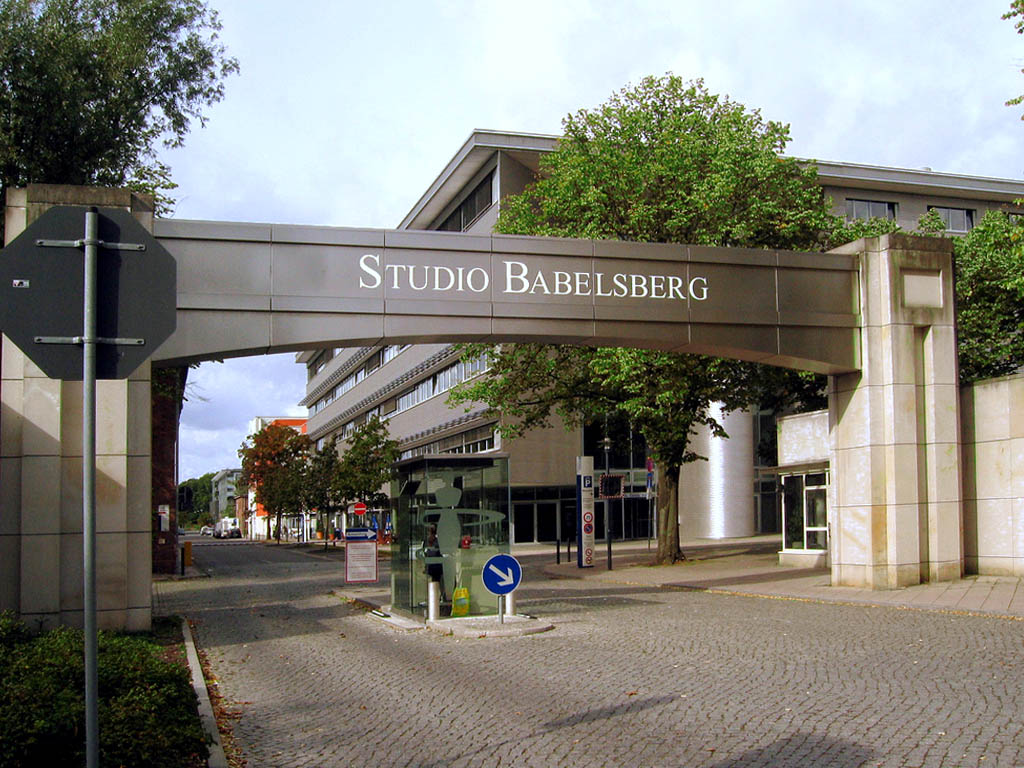The Story of Babelsberg
From the Birthplace of Film to the Media City
More than 100 years ago, the history of film began in Babelsberg with the establishment of the world's oldest film studio. Here, Asta Nielsen – the biggest movie star of her time – made her first film appearance in "Der Totentanz" (1912), a runaway success with audiences. Technological innovations quickly changed film production. In the early 1920s, the "unchained camera" technique enabled perspective changes. In 1929, "Melodie des Herzens" marked the advent of sound film.
Babelsberg is still a magical place and, same as the countless films that were made here, reflects historical evolution. After the period of warmongering silent films produced during World War I, Fritz Lang created his epic science fiction drama "Metropolis", which is part of the UNESCO Memory of the World Register today. The UFA era brought splendor and glamour to Babelsberg and saw actors and actresses such as Zarah Leander, Heinz Rühmann, Marlene Dietrich, and Hans Albers rise to international stardom. And yet, Babelsberg also stands for numerous dehumanizing films made on behalf of the Nazi government's Ministry of Propaganda.
In the post-war years, film production was resumed quickly under Soviet administration as films had become important tools of propaganda. May 1946 saw the official establishment of Deutsche Film AG (DEFA). In the period between the first post-war film "Die Mörder sind unter uns" (1946) and 1990, some 1,240 feature and television films representing different artistic and political perspectives were made in Babelsberg. The impact of the division of Germany on everyday life provided inspiration for seminal cinematic works such as Konrad Wolf's "Der geteilte Himmel" (1964) that, however, soon fell victim to the rigid film censorship regulations developed during the 11th Plenum of the Central Committee of the Socialist Unity Party. "Die Legende von Paul und Paula" quickly became an iconic film. "Jakob der Lügner" (1976) was the only East German picture ever to be nominated for an Academy Award.
Everything I had to know about filmmaking I learned in Babelsberg.
Alfred Hitchcock (1899 - 1980)
The fall of the Berlin Wall and reunification in the early 1990s heralded a new era for the film industry. The media city was born. Today, around 4,600 people work in 145 companies in the film and media industry on the 46-hectare site – from cinema, TV and animation production, stunt and special effects companies and post-production services to agency services and large-format printing, high-tech and IT companies, and radio and TV stations. It is thus an internationally unique network of expertise that also encompasses research, education and training institutions.
Feature films, animated films, documentaries, TV series and digital formats are being produced in Babelsberg: Not only national long-running hits such as “Gute Zeiten, Schlechte Zeiten” and “Schloss Einstein” are produced here, but also international blockbusters such as “The Hunger Games: Mockingjay”, “The Monuments Men”, “Bridge of Spies”, “Men in Black”, “Anonymous” and the “The Grand Budapest Hotel”, winner of four Academy Awards. Whether Steven Spielberg or Roman Polanski, George Clooney or Cate Blanchett – countless renowned filmmakers and international stars flock to Babelsberg. The Film University trains the next generation of filmmakers in the heart of this fascinating location and for this fascinating location.
Last but not least, the interplay between the historical tradition and current significance of the location for film has led to Potsdam becoming the first and only German UNESCO film city since October 2019, and thus part of the global UNESCO Creative Cities Network. The Creative Cities Office was established at the Film University in order to contribute directly to the activities of the Creative Cities Network through teaching and research and to offer a point of contact in the heart of the media city.




Visit the following websites for more information about companies and activities in the media city.
UNESCO CREATIVE CITY OF FILM
UFA GmbH - Deutschlands Marktführer im Bereich Film- und TV-Produktion
STUDIO BABELSBERG - Filmstudios
rbb - Rundfunk Berlin-Brandenburg
Deutsches Filmorchester Babelsberg
medienboard BerlinBrandenburg
ROTOR FILM Sound and Picture Postproduction
MediaTech Hub Potsdam
Filmpark Babelsberg GmbH
